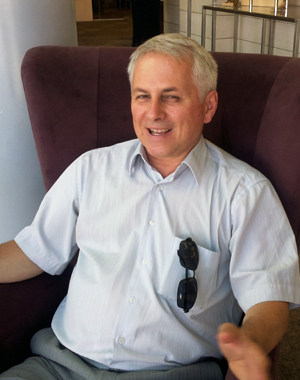"Southeast Europe and European integration: political, socio-economic and cultural aspects" - this is the motto at the 11th International Congress on East European Studies, held in Sofia from 31 August to 4 September. More about the history of the Congress we learn from prof. Alexander Kostov from the Institute for Balkan Studies with the Bulgarian Academy of Sciences:
 "The main organizer of the congress is the International Association for the Study of Southeast Europe. It was established in 1963 during the Cold War era, when, despite the complicated political situation, favorable conditions for scientific cooperation appeared. Then many research centers in the region started work. The Association studies history, literature, art, and societies from antiquity to the present day. The first congress of Balkan studies (as it is known in Bulgaria) was held in Sofia in 1966. Its following edition in the Bulgarian capital was in 1989. Traditionally it is organized on the Bulgarian side by the Institute for Balkan Studies with a Centre for Thracian Studies at BAS."
"The main organizer of the congress is the International Association for the Study of Southeast Europe. It was established in 1963 during the Cold War era, when, despite the complicated political situation, favorable conditions for scientific cooperation appeared. Then many research centers in the region started work. The Association studies history, literature, art, and societies from antiquity to the present day. The first congress of Balkan studies (as it is known in Bulgaria) was held in Sofia in 1966. Its following edition in the Bulgarian capital was in 1989. Traditionally it is organized on the Bulgarian side by the Institute for Balkan Studies with a Centre for Thracian Studies at BAS."
The 11th congress is attended by more than 250 specialists in various fields of studies from 26 countries. The worldwide academic elite in Southeast European Studies is now in Sofia. Of course, all countries from the region are represented as well as major research centers in Russia, USA, China, and Japan.
"This edition of the congress is dedicated to a very hot topic - The Balkans and European Integration, emphasizing not only the process of actual accession of the countries of the region to the European Union, but also integration understood in broader terms”, prof. Alexander Kostov explains. “We look into the participation of the Balkan countries into the European family in every way - cultural, political, economic, during the periods preceding the actual accession. There are 18 topics directly or indirectly associated with the motto of the forum. They relate to literature, linguistics, history, arts and media. Our session on economic issues drew huge interest - it was related to Russian and Chinese investment in Southeast Europe. There is a separate topic about NATO in the Balkans. "
There are many curious and little-known facts that scientists present at the forum. Prof. Alexander Novik from Russia told Radio Bulgaria more about one of his research:
"I am working on an article related to the medical practices of the Albanians who live in Ukraine. Their history is very interesting. At the end of the 16th century or the early 17th century, a large group of Albanians left their homes and settled in the region of Varna (eastern Bulgaria). They lived there for three centuries and during the Russo-Turkish War of 1877-1878, together with the Bulgarians and Gagauz people, they were forced to leave their villages. The Russian government allowed them to settle in the town of Odessa, where they live in four villages to this day, keeping their language and traditions, which are strongly influenced of course by Bulgarian language and traditions."
Examples of coexistence in the Balkans are numerous and no doubt they are particularly relevant in the modern severe refugee crisis. This topic has also found a place in the delivered talks.
English Rossitsa Petcova
20 nominees from 11 countries – that is the number of contenders for the “Bulgarian Woman of the Year 2024”, named in honour of Saint Zlata of Meglen . The award has been presented every year since 2009 by the Executive Agency for Bulgarians Abroad..
An initiative committee led by the historian Georgi Markov, has proposed that a monument to Khan Asparuh, the founder of the Bulgarian state, be erected on the site of the former Soviet Army Monument in Sofia, in order to serve as a unifying symbol for..
The Bulgarian dance group “Dilmana” based in Copenhagen will celebrate 15 years since its establishment with a celebration on October 18, the formation informed on its Facebook page. Dance group Dilmanа from Copenhagen to perform at the folklore..
Robert Joseph Miller, Bulgaria’s Honorary Consul in Nevada, was awarded the prestigious “Golden Laurel Branch” of the Ministry of Foreign Affairs for his..
The Bulgarian team is returning home with four medals from the Youth International Olympiad on Astronomy and Astrophysics (IOAA) , held in the Romanian..
The Association of Bulgarian Schools in America invites children from the Bulgarian community in North America to participate in a..

+359 2 9336 661
